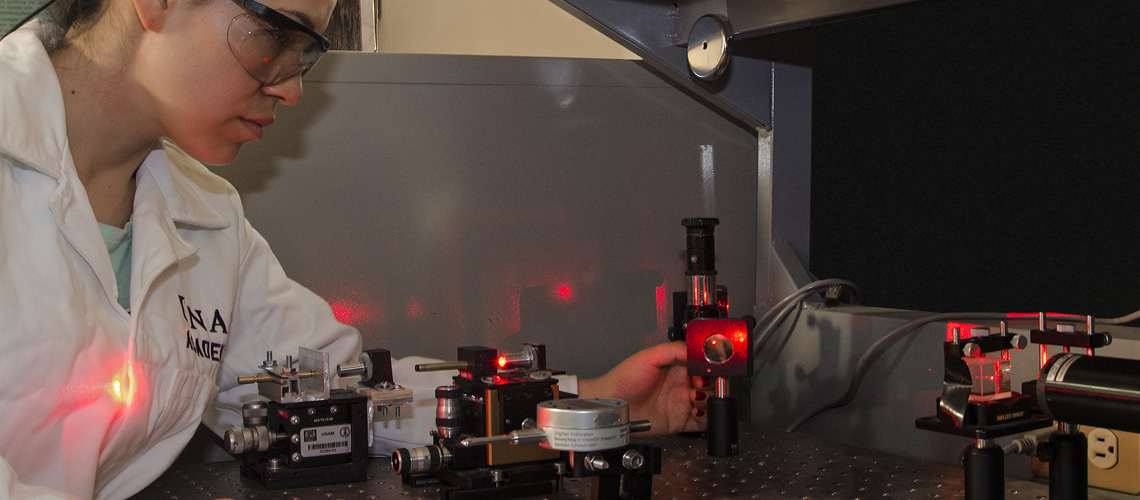The Telecommunications Engineer is the professional that applies knowledge of the basic sciences --Physics and Mathematics-- as well as those corresponding to signals, systems, electronics and computing to analyze, design, plan, organize, produce, install, develop and maintain in operation, and manage networks and telecommunications systems, contributing to meet the needs of the country and to promote development in this area, considered as a priority for the present and the future of Mexico.
The application for admission to the Telecommunications Engineering career must be made from the second or third semester, counting from the time of entrance to the original career. Students will be selected by the Career Admissions Committee at the end of the semester in which they applied, according to the selection criteria.
• You must be a student of the Faculty of Engineering at UNAM when applying for admission.
• Students enrolled in the Engineering(s) degree in Computer Engineering and Electrical Electronic Engineering may be admitted.
• You must have covered in full the credits of the first two semesters of the syllabus of the career in which you are enrolled.
• Preferably with a minimum average of 8.0.
• Apply in writing for admission to the Telecommunications Engineering career.
This application will be submitted to the Coordination of the telecommunications career.
• You should be accepted by a Career Admissions Committee, that will evaluate the request according to the applicant's possible academic performance. If deemed appropriate, the committee may ask applicants to be there for an interview.
• The Admissions Committee will monitor compliance with all entry requirements.
In case of being accepted, the admittance will become effective as of the semester immediately following the semester during which you applied. For subjects that students have completed before applying for a degree in Telecommunications Engineering, the revalidation will be automatic only in those subjects approved that are common (in name and key) to both plans, in other cases the Coordinator of the Telecommunications Engineering Degree will establish the equivalences between subjects.
The admission to Telecommunications Engineering will not be considered as the career change provided for in Article 20 of the General Registry Regulations. Taken from the document "Project to modify the curriculum of the degree of Telecommunications Engineering", approved by the Technical Council of the Faculty of Engineering on June 11, 2014.
Important note: The curriculum of the Telecommunications Engineering Degree is in the process of approval by the Academic Council of the Area of Physical-Mathematical Sciences and Engineering (CAACFMI). January 2015.
The student interested in the Telecommunications Engineering Degree, in the Faculty of Engineering at UNAM, must be graduated from the National Preparatory School, College of Sciences and Humanities or other programs of Higher Education. It is desirable that you have studied the area of Physical-Mathematical Sciences or the set of subjects related to these fields of knowledge in the College of Sciences and Humanities, or in other curricula of Preparatory Education. In all cases, the desirable profile includes the following knowledge, skills and attitudes.
Knowledge of mathematics in algebra, analytical geometry and differential and integral calculus of functions of a variable is required. You must also have knowledge of physics, particularly on topics related to classical mechanics, as well as general knowledge of chemistry and computing. It is also desirable that you know English, at least at the level of understanding texts. About skills, it is important that you have a willingness to work in a team, ability to analyze and synthetize, and adapt to new situations as well as to have a creative spirit.
Graduates of the Faculty of Engineering should possess capacities for innovation, potential to contribute to the creation of technologies and entrepreneurial attitude, with social sensitivity and professional ethics; with potential and vocation to become a factor of change. They will have clear ideas about mathematical modeling of physical phenomena and optimization; will be open to both continuous learning and interdisciplinarity. They must handle their language adequately and have oral and written communication skills.
SpecificAt the end of their professional training, the graduates in Telecommunications Engineering will possess the following knowledge, skills and attitudes.
They will have a high-level of professional training in the fields of telecommunications networks; signals and radiocommunication systems; radiofrequency, optical and microwave technologies; policy, regulation and standardization of telecommunications and space systems engineering and their applications.
They will have solid scientific and technological bases that will allow them to understand, analyze and give practical solutions to problems related to modern telecommunication systems.
They will have an integral training in telecommunications, which will give them the vision to insert themselves in the labor field, to develop his own company, or to successfully join research and technological development activities.
An entrepreneurial and leadership attitude will be a part of your training, which will allow you to be a promoter of change in the face of national and international competitiveness, fully aware of the current problems and future perspectives in the field of work. You will identify your responsibility and social commitment, starting from the search for excellence in the development of all its capacities, without neglecting the moral and ethical framework of its actions.
The attitudes that the graduates of the degree in Telecommunications Engineering should have, from a professional point of view, are:
• Be creative and innovative.
• Be disciplined and dynamic.
• Entrepreneurial and leadership attitude with initiative to generate jobs.
• Have an open mind, oriented to solving engineering problems.
• Be responsible and critical.
• Have a desire for keeping up to date, and overcome problems in their profession.
Regarding social attitudes, you should develop the following:
• Be aware of the national issues, based on the knowledge of the country's reality.
• Vocation of professional service.
• Promote a change of mentality in the face of international competitiveness.
• Have a humanistic attitude and service to society.
• Integrate into the country's active economic life with ethics and social commitment.
• Be proud of being a student at UNAM and recognize the social commitment that this entails.
The telecommunications engineer uses the knowledge of the physical and mathematical sciences, and engineering techniques to develop his professional activity in several areas, such as optical, satellite, microwave communications, wired and wireless communications networks, broadcasting systems, radio navigation systems, as well as the administration, design, construction, operation and maintenance of telecommunications products and equipment. To solve the problems posed by the professional practice, the telecommunications engineer applies the mathematical and physical analysis.
Generally, he/she performs interacting with professionals of similar disciplines like electrical, mechanical, industrial engineers, in computer science or communications, besides administrators and economists, among others.
The present field of work is wide and includes the following areas:
Its current and potential field of work is very broad and includes, among others, the following areas: telephone, satellite, radio, microwave, and fiber-based systems, as well as digital networks for telecommunications and computers.
This professional works in areas related to electronics, control, telecommunications and computing, both in the public sector (state secretariats, decentralized agencies, state and parastatal), as well as in the private sector (specialized consulting, integration, Installation and maintenance). Thus, its preparation enables him/her to advance in management and development areas, among others. In the same way, he/she works in educational institutions, in which they are dedicated to carry out projects of pure and applied research.
The graduate of this bachelor's degree plays a fundamental role, since he is qualified, not only to design and install telecommunications equipment, but also to promote technological and scientific development in this field. It is important to mention that you can also work independently, after a few years of having started your professional activity.










